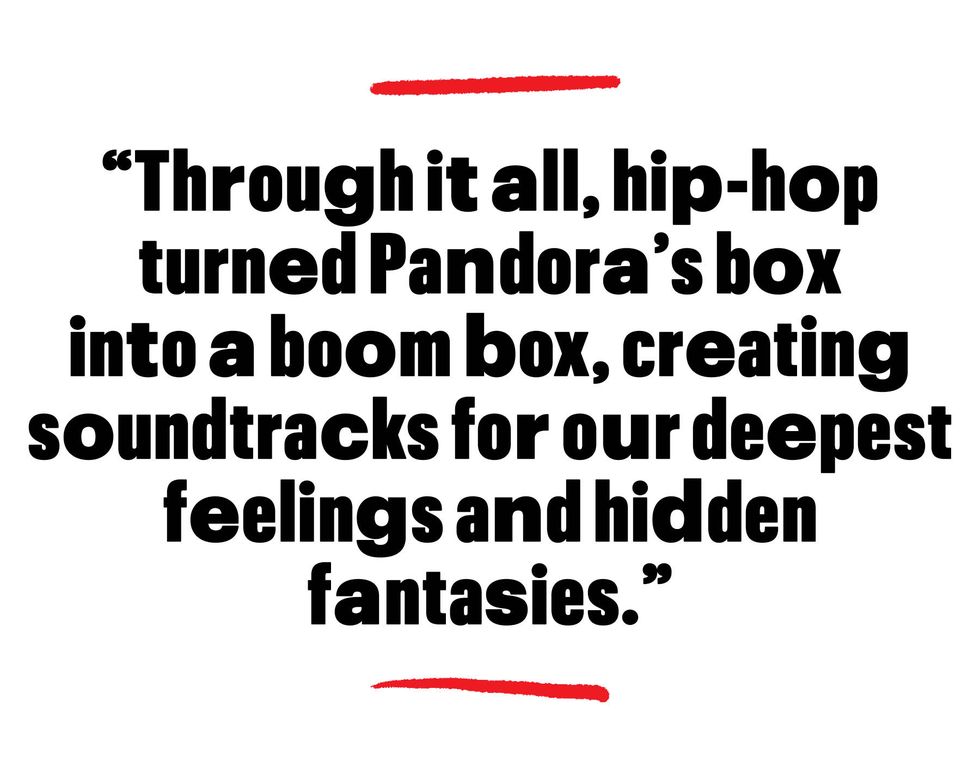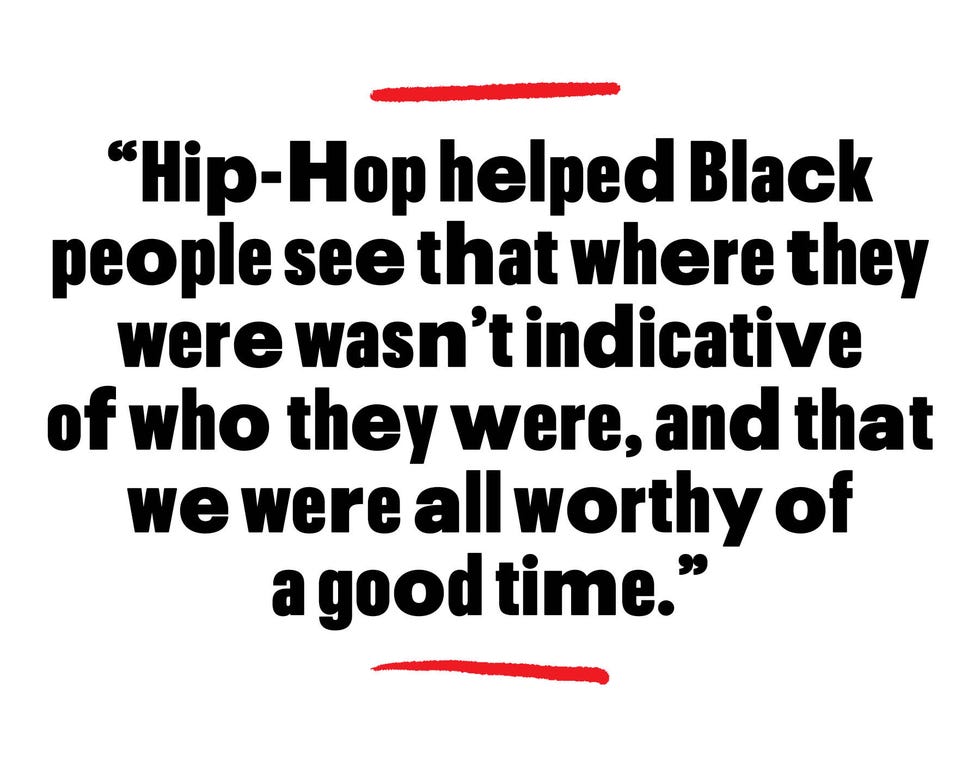This story is part of “Hip Hop is Life,” a series of profiles and features revisiting key moments at the intersection of hip hop and Black men’s health over the past 50 years. Read the rest of the story here.
It was May 12, 1998.two months after my 10th birthday and a week before DMX’s debut album. It’s dark and hot in hell, It was planned to make an emergency landing at a store. In Brooklyn, $5 bootleg albums lined up in street vendors’ showcases long before Tower Records slapped $15 stickers on them. Sometimes, when I wasn’t sure if my mom had enough food in the fridge to scrape together dinner, I would swipe a few copies from downtown Brooklyn and sell them to my neighbors in East New York. Usually I end up making him $6. That’s enough money to pay for four chicken wings and shrimp fried rice at the local Chinese restaurant, which outnumbers the neighborhood grocery store.
That was my goal for the day. All I could think about was hunger. A black salesman, probably three times my age and weight, was tending to customers when I saw an opportunity to snatch a few CDs and run away. Before I could take off my heels, he grabbed my wrist and pulled me an eyelash away from the barrel of his pistol. My crying apologies fell on deaf ears as he kept asking why I was trying to take money from him. I froze. Dealing with this type of situation is never in textbooks or family advice. Pedestrians hurried away with the typical aloofness New Yorkers adopt as a means of self-preservation. My mind was blank. I don’t know if it was because humor was instinctively my third (and preferred) option next to fight or flight, but it occurred to me that I could just do it for 15 cents. I was just trying to make a dollar.”
His bloodshot eyes softened, his grip loosened, the gun lowered, and he grinned, grinning like he did when he had no choice but to agree. “I feel you,” his last words made me run to the nearest station in tears. I never told his parents because I was afraid they would be punished for stealing. It wasn’t until a month later at a summer block party that I actually heard Tupac recite the exact line from the song that saved my life, “Keep Ya Head Up.”
The man released me. Because hip-hop translated my despair into a language he not only understood, but spoke. He, like me, and like Tupac, Tupac’s mother, and my mother, who “made a miracle every Thanksgiving” (“Dear Mama”), made hope out of a shitty situation. I was about to sleep. Since that day, hip-hop has become more than just music to me. I became a guide.
Although hip-hop has been around for 50 years, its role in documenting and sustaining the evolution of Black men’s health has gone largely unacknowledged. What would happen if it fell on miseducated ears accustomed to listening to hip-hop? Listen to his 1982 classic “The Message” by Grandmaster Flash & The Furious Five and you’ll realize that it was one of his earliest hip-hop records to bring the misery endured by black people to the outside world. You will understand. But listening requires a deeper level of understanding about the people the songs are talking about. When Ed “Duke Booty” Fletcher wrote the lyric “In this land of milk and honey you gotta scam,” he was thinking that black Americans, with 15 percent unemployment and crime the only occupation, It represented the fatalistic feelings I had experienced. many.
“What’s amazing about ‘The Message’ is that it connects social situations and mental health,” says John, a professor of neurology at Columbia University and founder of the organization Hip Hop Public Health. says one Olajide Williams, MD. “It connected poverty and mental health. It connected the social determinants of health to mental health. That song is ‘Public Health 101.’ It is the social conditions caused by structural racism that have created the environment that drives people to the mental health cliff.
At its core, hip-hop is a celebratory art form built on the foundation of carving out time and space for joy in dealing with the world. Remember, hip-hop was born when the Bronx was on fire and people were dancing. Hip-hop helped black people understand that where we are doesn’t define who we are and that we all deserve to have a good time. This is from the Sugarhill Gang, whose funky aspirations produced their first hip-hop hit (“Rapper’s Delight”) in 1979, to the collective moshing of the world by reassuring us that “we’ll be okay.”・This is the through line to Kendrick Lamar (“Alright”) who incited Pitt. America after Michael Brown.that’s hip hop.
To celebrate 50 years of hip-hop, Men’s Health does more than pay homage to the music. We show how the genre has functioned as a record of Black men’s health over the past 50 years. Hip hop takes on issues of the era that disproportionately harm black men, such as gun violence, addiction, HIV/AIDS, diabetes, and mental health issues, and adds a new way to give young black men a name for their feelings. has given us the language of .
Hip-hop is evolving, and each of the titans on the cover have enjoyed decades-long careers thanks to their multifaceted influence on black men. Each of these men represents an archetype of masculinity that sensitive black men, myself included, can draw on to form their own identities.
If your high school gym teacher tried to do sit-ups while hanging upside down, he’d probably stick his hips out. 50 Cent pulls it off with ease in his music video for “In Da Club,” depicting the cruel determination of a black man who is institutionally shut out of the American dream: actually get rich or die. He continued to build a television empire based on the cruel determination of Kada. must be employed. At age 12, after hearing Common say “I’m done dieting” on “Resurrection,” he was a 24-hour vegetarian. A few years later, Love Is. ” When he raps, “As men, we’ve been taught to hold back / So we just don’t know how until we’re older men,” he admits to being vulnerable with his feelings. It gave me the courage to become Busta Rhymes transforms from Terminator 2’s liquid metal into a silver-armored symbiote in “What’s It Gonna Be?!” And this was the polarizing late ’90s, the so-called “shiny suit era,” when many rappers felt the genre was sacrificing the rugged realism in favor of ostentatious commercialism. Method Man’s “All I Need” depicted the ghetto as a fertile ground for black love.Ludacris hasn’t aged a day since he took over. chicken and beer Wiz Khalifa shatters the lazy, stoner millennial trope with every MMA workout he shares with his 40 million followers on Instagram.
Through it all, hip-hop has turned Pandora’s box into a boombox, creating the soundtrack for our deepest emotions and hidden fantasies. No matter what traumas and tragedies have shaped the best of hip-hop, hip-hop is also a unique and joyful form of musical expression, allowing people from all walks of life to find their own truth in these unique Black stories. Find some. You’ve probably never run for your life on a battlefield, but Outkast’s frenetic “BOB (Bombs over Baghdad)” will unleash your desperation and break your personal best running time. His DMX scream of “You guys are going crazy here” on the closing track “Party Up” is a cubicle worker releasing his frustrations over the workplace microaggressions he’s been suppressing all week. It helped me. Anyone can form a brotherhood under Mobb Deep’s “We’re in this together, son, your beef is mine” credo in “An Eye for an Eye.” From every peloton-level participant to every Pulitzer Prize winner to every person who sees themselves reflected in the lyrics, hip-hop is a place where the stories of black men not only matter, but help move the world. It shows what you are doing.
The health effects of hip-hop aren’t necessarily positive, but if you know how to listen to hip-hop, you can hear the voices of black lives being saved just by being present. Now is the time to celebrate how successful hip-hop has become.
A version of this article was published in the September 2023 issue of the magazine. Men’s Health.




